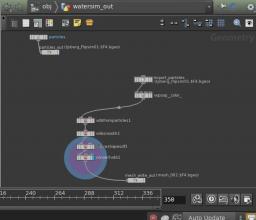Search the Community
Showing results for tags 'cooking'.
-
I am curious if it is possible to clock how long it takes to cook a surface operator and interrupt if it goes above a certain limit, preferably within a python SOP? Backstory; there are cases when a polyexpand2D node takes excessively long time to cook. I've contacted SideFX for this unexpected behavior. Long story short, this is what they recommended: And it does, when you translate the input geometry of the ‘polyexpand2d’ SOP the results do vary. So now I am trying to figure out a way to clock a particular section of the network tree, and if it takes longer than X amount of time, I want to translate the input ever so slightly. Hopefully this will help it so it doesn't take +1 hour to cook (average is somewhere between 1-5 seconds). I have been looking into hou.perfMon but that didn't really lead me anywhere. Let me know if anyone has any suggestions. Pseudo Code: import time trans_node = hou.node("../translate1") cook_node = hou.node("../COOK_THIS") start = time.time() time_limit = 5.0 rot= 0.0 while current_time < time_limit: try: cook_node.cook() except Timeout: rot= random(0.0, 360.0) trans_node.parm("rx").set(rot) cook_node.cook() continue Thank you!
-
Hey all, Sorry to add another Python cooking question (I've seen a lot, searching), but here goes. I have two subnets, a 'source' (from an .fbx) and a 'target'. The Objects in each correlate by name, and those in the source subnet are keyframe-animated. I'm driving the target Objects via: sourceMg = sourceNode.worldTransform() # beep boop, additional calculations go here targetNode.setWorldTransform(sourceMg) It works great, but once Houdini caches the frame the script is no longer (apparently) cooked, which makes sense--I pasted my code into a Python Script Object for convenient testing, which I suppose is not its intended use. If the HOM documentation is telling me what to do instead, however, I don't see it. There's the 'Python object' page, but I don't know that this is quite the same. In short: my script works as intended, but after the scene plays through once, Python stops moving the target nodes (I'm guessing because Houdini quits cooking it, since it's not doing anything Houdini expects it to do, like make geometry). Where does a script like this belong? I'm sure there's something embarrassingly obvious I'm missing--it's just a little extra confusing to me because I have to manipulate everything on the Object level. Thanks in advance for the help! If anything's unclear, lemme know
-
hey fellow houdini artists hope that you are doing great today! i recently just notice that my houdini is having to cook everytime i lay down a node a.e geo grid sphere...... and its taking too long to select any node by right click, so i am having to highight the node everytime i wanna select it? .never used to do this... thought i should shoot a question about this thanks
- 13 replies
-
- houdini general question
- cooking
-
(and 1 more)
Tagged with:
-
Hi there! I've been scripting in Maya for some years now and I decided to give Houdini a try but I still have some issues understanding how cooking works. I'm trying to implement my own cellular automata (a classical 3D Game of Life). The algorythm is pretty simple: my class first generates a virtual 3D grid which is made of livings cells (1) and dead cells (0). Then, at each iteration of a custom user input parameter, it analyses the current grid and does some work to modify it. But I have a hard time figuring how to do this. How can I have my script memorize its current state at each frame? For now the node just cooks entirely at each iteration, which is obviously pointless. Is there a way to execute only one method of my class? I thought about using a callback on the iteration parameter but I can't understand how it works in Houdini (I just made a "New Operator Type" and wrote my script inside the "Code" tab). Sorry if this sounds stupid, I'm still learning! And I couldn't find anything useful on Google.. Thanks in advance for your help!
-
Hi, I've seen a few topics on this subject, but none actually solved the issue in the end. So here's the problem: I'm writing out a flip mesh (vdb) to disk (using the rop output driver), and the first 1-2 frames go just fine (takes +- 3 min per frame). Of course Houdini uses a lot of RAM for this, but the problem is that it doesnt flush it after its finished writing out a frame. The cache stays, and houdini doesnt free up the memory, causing the whole computer to slow down (it then takes like 3 hours to write out 1 frame!). Is there a way to clear the node cache/memory after cooking a frame?flushing the cache from the cache manager isn't really possible (since I'd need to stop the writing after every frame). After i stop the writing, the memory only frees up again after I actually close houdini. p.s. I have an AMD FX8320, with 12GB RAM and a weta digital 3TB green HDD. Using houdini 13, on windows 7.



